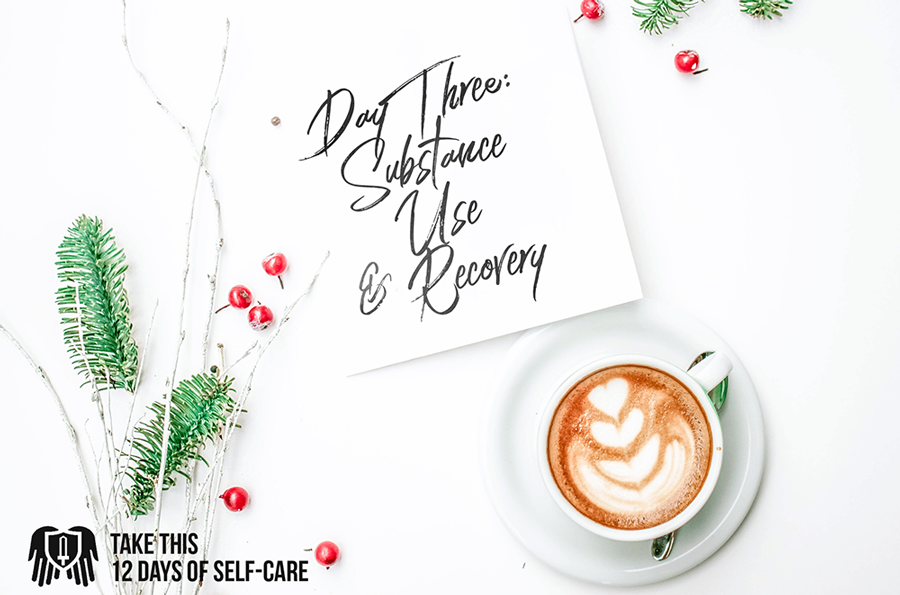
On the third day of our 12 Days of Self-Care series, Take This volunteer Jay VanDenBogaard shares expertise on substance use disorders. For more helpful tips on coping with common stresses of the holiday season and the transition into the new year, check back every day.
The month of December can be hard for many of us, with celebrated holidays, less sunlight, travel plans, family visits, and more. For people in long-term recovery or those struggling with a substance use disorder, it can be especially difficult dealing with increased stress and possibly co-occurring mental illnesses, including being impacted by trauma. Things such as sentimental memories or traditions, familiar smells, music or other sounds, tastes, prevalence of media, even the expectations of others may have a triggering effect. Once you add alcohol or any other substance to an environment it can become even more challenging to want to remain sober.
While this time of year can often bring on a desire to engage in celebration and decoration, it can also bring on feelings – for many, of loneliness, anger, loss, regret, and shame. Along with those desires and feelings come a tendency to self-medicate, to need to feel included, or sometimes – just to feel. Sometimes, the key to surviving the month of December or any other time is knowing what your triggers are and how to seek help or take care of yourself.
The following may help you or someone you know cope with the increased stress as the month moves along or when you feel any triggering events occur.
- Be mindful of what triggers you (people, places, things, etc.). Determine what may be helpful in handling these triggers such as avoidance skills versus refusal skills. For example, is this a place you can avoid or an event you feel obligated to attend and will need to practice refusal skills if offered alcohol/other drugs? Keep your list handy, in your phone, on your wall, bathroom mirror or wherever you feel it may be useful or safe. Share it with your support system or sponsor.
- Seek out a support system. Having at least a few supportive friends/family members who support your recovery/sobriety efforts is essential to reducing interpersonal stress. These people should be reliable, trustworthy, and able to understand your needs.
- Develop a plan of action. It is often helpful to have plans mapped out ahead of time. It can reduce stress when you know where you will be spending time, how long you plan to be there, etc. You may even consider scheduling check-in calls with a sponsor. Other items on your plan may include self-monitoring of your own health such as hydration (drinking plenty of water), nutrition, exercise, sleep hygiene (getting enough sleep), etc. Additional stress can manifest into physical symptoms such as headaches, stomach aches, and inability to sleep. Consult your primary doctor with any symptoms.
SAMHSA, the Substance Abuse and Mental Health Services Administration offers “10 Guiding Principles of Recovery” that relates specifically to the motto of Take This. The first principle emerges from hope. Hold on to that happiness ahead and know that there is understanding, acceptance and inclusivity in the world. We are out here. There are more of us every day. Our aim is to reduce the stigma, to speak loudly enough to be heard so that others understand and know they are not alone and that there are many paths on this journey. That every success is a victory – and this month I hope you are one.
Jay is best described as an ongoing optimist that works daily at interpreting the difference between good and bad anxiety – while dancing. Jay is a licensed clinician for substance use disorders at a university. Jay has worked in the field of substance use and substance use disorders since 1995. Jay enjoys DragonVale daily though prefers Mortal Kombat, Bioshock, and even Galaga to recover from long work days or fill time in between cons. Mostly, Jay enjoys time playing with ferrets and people who are open-minded, accepting, and inclusive.
This article is not a substitute for medical advice or professional counseling. While we at Take This want to provide you with resources, we do not recommend or endorse any particular site, treatment, therapy, or resource. We provide these links at our sole discretion but have not necessarily vetted or reviewed any particular resource. We assume no liability for the use of the information or resources on these sites and encourage you to use your own best judgment when reviewing these resources.
If you live in the US and you’re having suicidal thoughts, reach out to the Suicide & Crisis Lifeline or call/text 988. If you’re outside the US, you can find local crisis lines at Suicide.org. If you’re even debating whether you should call them, you should call them. The Suicide & Crisis Lifeline handles all psychological crises, not just suicide.
